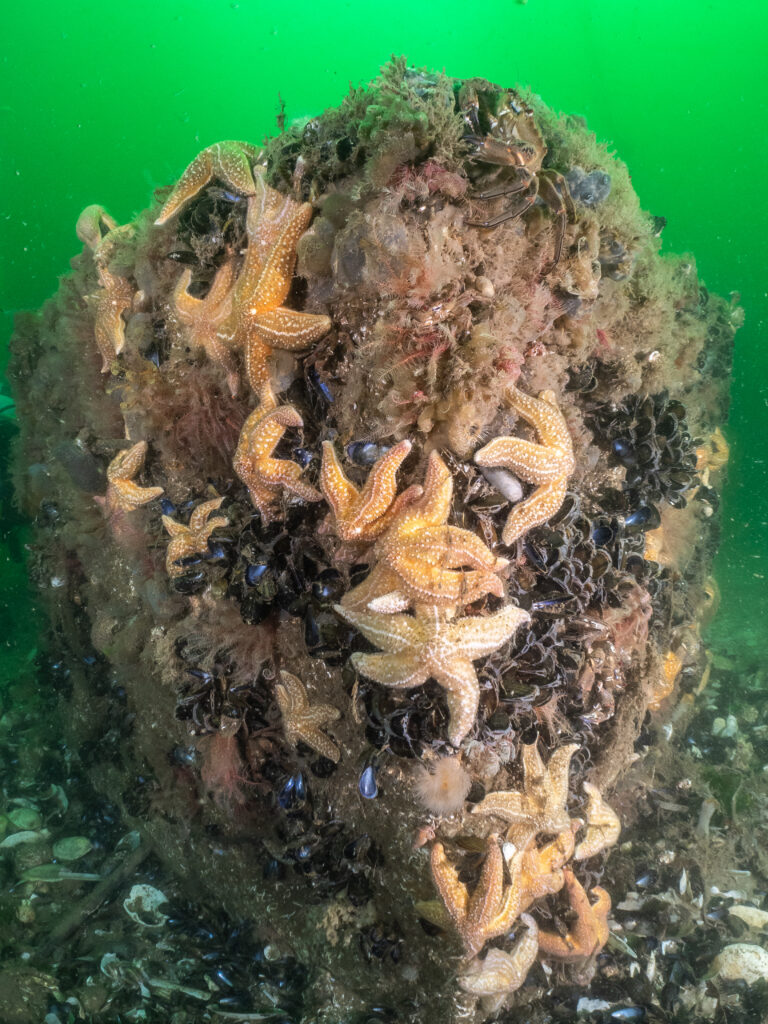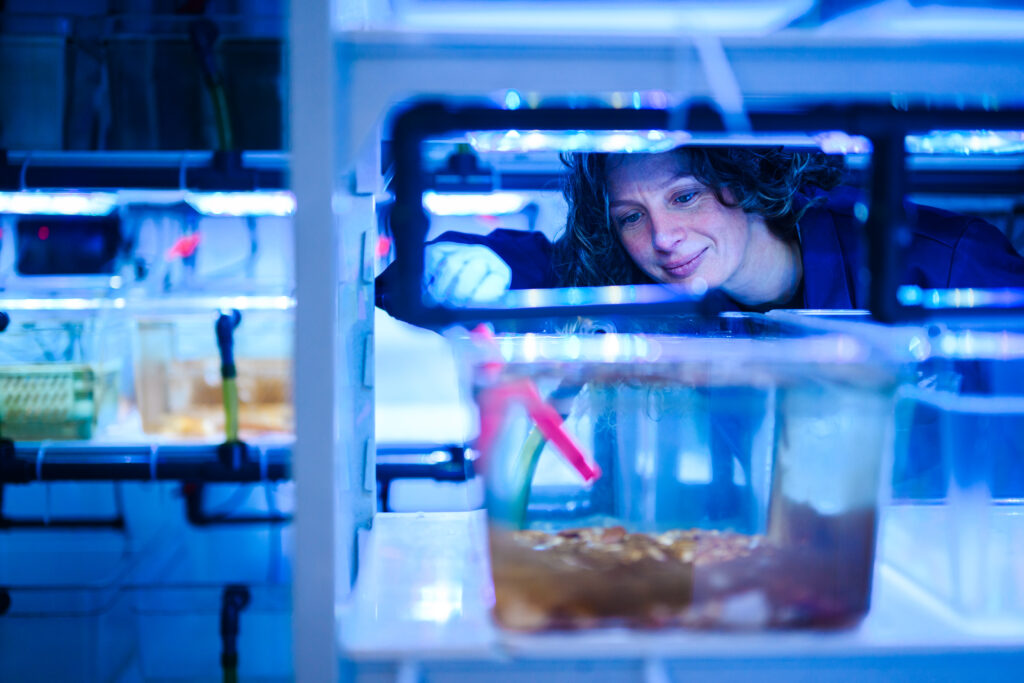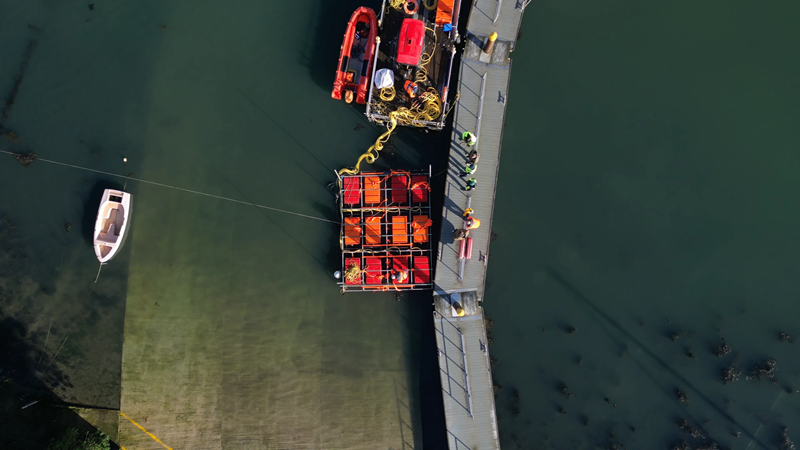An innovative underwater intake line will not only support the flourishing marine life in Plymouth Sound, but also provide a vital channel for seawater to the Marine Biological Association (MBA).

After two years of careful consideration and planning, a team of expert engineers and technicians have developed the Seawater Life Support, a new water intake line with mutual benefits for ocean life and marine research.
Advancing marine science and conservation
The Marine Biological Association (MBA) overlooking Plymouth Sound is home to the Research Aquarium and has a long history of supporting world-class experimental research to better understand ocean life.
Fresh, unfiltered seawater is pumped from Plymouth Sound into the Research Aquarium reservoirs, where it is re-circulated before being returned to sea.
The Research Aquarium provides specialised facilities for both MBA researchers, collaborators and external organisations to carry out critical marine biology research.
At present, scientists are using the Research Aquarium to grow native kelp on gravel substrates in a bid to protect and safeguard kelp populations in the UK. Scientists are using the Research Aquarium to grow native kelp under optimal conditions, which are then returned to the sea.
Seawater Life Support
Currently a small polymer pipe located 30 metres off the coast East of Tinside Lido is used to take seawater to the Research Aquarium, but this is coming to the end of its life and is in need of replacement.
The Seawater Life Support, a new 27- metre-long intake line, has a lifespan of up to 30 years and will enhance the efficiency and sustainability of operations at the Research Aquarium. Seawater can only enter the Research Aquarium at high tide, but the new intake line will provide a flow of seawater to the facility throughout the tidal cycle.

Visionary project
The MBA has partnered with a variety of stakeholders to deliver the Seawater Life Support.
Plymouth-based engineering consultancy Structural Evolution Ltd have played a crucial role in making the project a success by overseeing the design, supply, and deployment of the new environmentally friendly water inlet system. They focused on a low carbon impact approach, bringing together local stakeholders to achieve a collaborative effort among Devon and Cornwall SMEs to support the MBA.
ARC Marine is an award-winning eco-engineering company that brings nature-inclusive solutions to the coastal defence, offshore energy and aquaculture industries and will install their innovative Marine Matts to cover the new water intake line.
The Matts, which are made from carbon-neutral concrete alternative called Marine Crete, have been designed with a texture and surface that can support and replenish biodiversity of local marine life whilst providing durability and protection for the intake line.
Based in Cornwall and Devon, the company specialises in designing, manufacturing, installing and monitoring carbon-neutral subsea protection structures in order to enhance and study biodiversity.
To eliminate the use of oversized vessels and cumbersome equipment, ScaffFloat will provide a floating barge to ensure the pipe is secured safely in place with minimal impact on marine life.
The ScaffFloat system uses custom-made, reusable plastic floats that integrate with standard scaffold parts to make pontoons that can be customised with a range of extras such as engines, cranes, deck winches, moon pools and many more. The floats are made from recyclable plastic and when they reach the end of their life, they are shredded and turned into new floats, making ScaffFloat the only 100% recyclable pontoon on the market.
Invented and made in Cornwall, ScaffFloat is now being used in projects across the country and further afield; the system has been sent as far as Australia.
A professional dive team from Seawide Services are supporting the installation by securely detaching the Matts and water intake line from the barge when landed safely on the seabed at final install location.
Established in 1972, Seawide Services is a leading marine contractor, dedicated to meeting the South West’s mooring and salvage needs.
The underwater installation which will take place from Queen Anne’s Battery, Plymouth, is dependent on several factors like tide and weather conditions and brings together a variety of local businesses to ensure the process runs smoothly.
W.H Scott & Son Engineers will be providing site management, and a crane to lift the intake line in place.
With over 126 years of experience in lifting and engineering, WH Scott & Son Engineers emphasize sustainability, prioritizing environmental, social, and economic performance across its operations.
For the Seawater Life Support project, a seamless installation of the water intake line and the Marine Crete mats was crucial. WH Scott & Son Engineers will coordinate lifting and land-based transport services of the 27 meter long water intake pipe and the 4x 32 tonne matt assembly, to ensure a low carbon installation.
Following the installation, the University of Plymouth will re-instate an improved ‘Plymouth Underwater Teaching Observatory’ (PLUTO-2) camera and sensor system on the intake structure. This publicly available live streamed video footage will give scientists, students, and dedicated viewers the unique opportunity to observe marine life in the vicinity of the new intake, whilst also archiving data for future projects.

MBA Chief Executive Professor Willie Wilson said: “This ambitious project demonstrates our commitment to promoting sustainability and innovation in marine research. We believe that the new eco-friendly water intake line will serve as a model for other research institutions and aquariums worldwide, inspiring them to adopt more environmentally conscious practices. We are excited about the positive impact this project will have on our operations, the environment, and the scientific community as a whole.”
Tom Birbeck, CEO & Founder of ARC Marine said: “At ARC Marine we’re proud to be part of a project that can not only enhance biodiversity in the waters of the Plymouth Sound but also set a global precedent for sustainable marine cable and pipeline protection. Sustainability goes to the core of all we do, and we’re delighted to be installing more of our carbon-neutral Marine Matts which will shield the pipeline from the harsh coastal elements, but without the high carbon footprint and harmful marine plastics associated with conventional pipeline protection.”